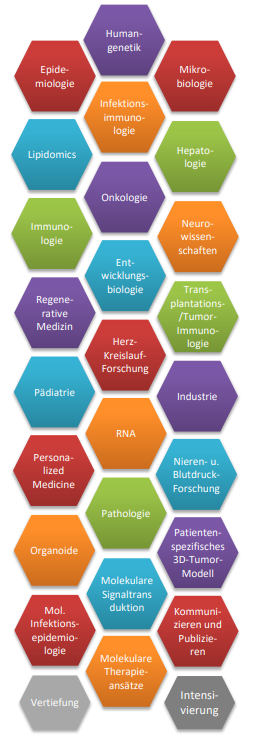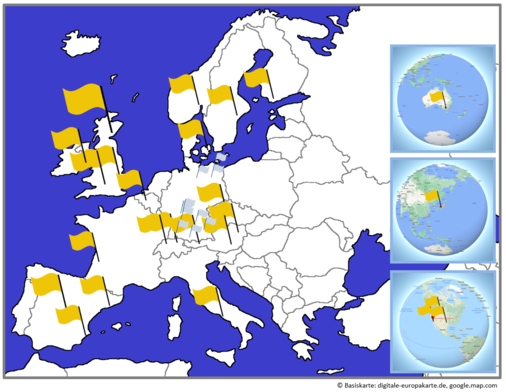
Master's Degree Programme in Molecular Medicine

The film by students for students and further impressions are linked here:
Photos and videos about the degree programme.
Objective
The degree programme is located at the interface between medicine and biology. The aim of the programme is to train students to become qualified young scientists for the biomedical field, where technological progress poses major challenges. The programme combines theoretical knowledge from human medicine with scientific skills from biology and other life sciences. After completing the Master's Degree Programme in Molecular Medicine, you can pursue a career in university research, industry and private laboratories, among others.

How is the degree programme structured?
A total of 120 credit points (CP or ECTS) and a maximum of 120 semester hours per week (SWS) are required to successfully complete the Master's degree programme. It is recommended to achieve 30 CP per semester.

The Master's Degree Programme in Molecular Medicine is generally completed in four semesters. In the second and third semesters in particular, the focus is on internships with individual supervision, which lead to in-depth training in modern biomedical research methods. The content of the programme is put into practice in the fourth semester in the form of a Master's thesis on a biomedical topic.
Compulsory module I:
- Good Scientific Practice, lecture
- Epidemiology, lecture
- Ethical and legal foundations of biomedical research, seminar
- Clinical research, seminar
- Biostatistics, lecture and exercise
- Genomic data analysis, block course with exercise
Compulsory module II:
- Fundamentals of clinical medicine or disease patterns and their molecular mechanisms, lecture
- Clinical chemistry, pathobiochemistry/physiology, lecture
- Molecular basics of clinical medicine, seminar
Compulsory module III:
- Laboratory practical course
- Seminar on the practical course
- Modern research directions and research areas (lecture series), seminar
- Methods courses, workshop with seminar
Compulsory elective modules:
In the Master's degree programme, students choose from over 20 different compulsory elective modules, selecting the six that correspond to their individual interests. Each compulsory elective module consists of a four-week full-time internship in a scientific working group and accompanying courses. Further information can be found under "Internships".
Master's thesis:
At the end of the last compulsory elective module, students begin the seven-month Master's thesis in a working group of their choice. Supervision is usually provided by a university lecturer from the Faculty of Medicine or the Faculty of Biology and Preclinical Medicine.
Internships
In the Master's degree programme, students have the opportunity to choose from over 100 laboratories, depending on their individual interests, a total of 6 compulsory elective modules, 1 practical methods course and 1 Master's thesis.
(For more information on the individual labs, click on the image).
Stay abroad
In the course of the Master's programme, students have the opportunity to weave a stay of several weeks abroad, in industry or at other universities in Germany into their study plan in such a way that they do not have to enrol for an additional semester. Of course, the lecture-free period can be used for this, as can individual free blocks in the 2nd and 3rd semesters. Students will receive support with financing and making contact.
Field reports (in German)
How do I apply?
Applications for admission to the Master's degree programme must be submitted by 1 July of the respective year. You must fulfil three criteria for a successful application:
- Final grade of the Bachelor's degree programme 2.5 or better (exceptions are possible)
- Bachelor's degree in "Molecular Medicine", "Biomedicine", "Experimental Medicine" or a related subject
- German language skills with at least level B2 or DSH2
- English language skills with at least level B1
Please refer to the information sheet (DE) and the Examination and Study Regulations for the Master's Degree Programme in Molecular Medicine (DE) for more details on the application process.
Information event
every year in mid-May
Online via Zoom
Registration required at christina.kolbeck[at}ukr.de
At the information event you will learn
- which documents you need to submit for your application,
- how you can transfer from the Bachelor's degree programme to the Master's degree programme even if you have not yet completed your Bachelor's thesis and therefore your certificate,
- what opportunities you have as a student on a related degree programme and
- how the Master's degree programme is structured.
Student publications
Impressions from the degree programme
Photos and videos around studying
(Excursions, congresses, Molecular Medicine Days and the self-made study programme film)
Examination regulations, module catalogue and course catalogue
Contact us
For organisational questions regarding application, course registration or dates, please contact:
Christina Kolbeck
phone +49 941 944-18814
master.molmed[at]ukr.de
Office at the University Hospital:
Building ZMK / room 4.110
Examination Committee
The Examination Committee is responsible for the organisation, implementation and decisions in examination matters:
Prof. Dr. Peter Hau, NeuroOncology (Chair)
Prof. Dr. Barbara Schmidt, Virology (Deputy Chair)
Prof. Dr. Gunter Meister, Biochemistry
Prof. Dr. Richard Warth, Medical Cell Biology
Master's programme in Molecular Medicine
Contact
Christina Kolbeck, MA
phone +49 941 944-18814
e-mail





